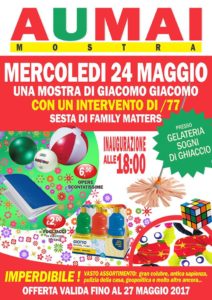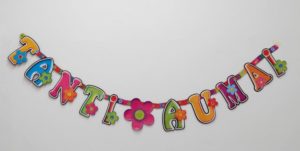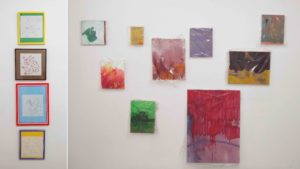Via Tanari Vecchia 5/a
Bologna
http://gelateriasognidighiaccio.com
www.facebook.com/gelateriasognidighiaccio
In May 2017, the artist-run art space “Gelateria Sogni Di Ghiaccio” in Bologna presented the group exhibition “Family Matters”. For this purpose, eleven Bolognese artists from different generations reflected the subject in their means of artistic expression. However, the concept of “Family matters” differs from a conventional group show: there are eight chapters, which are on view in the same place, but not at the same time. Filippo Marzocchi, Mattia Pajè and Marco Casella decided to dedicate four days of one month for each section. From Wednesday 24 to Saturday 27 May “AUMAI” by Giacomo Giacomo took over the space.
“AUMAI” by Giacomo Giacomo
The exhibition’s title refers to a Chinese consumer-store-chain with the same name. In 36 shops in Italy, people can buy close to everything from adapters through clothes and tableware to zappers for low prices. The employees are mainly Chinese, so that the European consumer gets the impression of a family-run market. That might have been the aspect for Giacomo Giacomo to introduce “AUMAI” into the exhibition “Family Matters”.
In any case, the oeuvres on view often enter into the aesthetics of the shop, starting with the announcement designed like an AUMAI-advertisement. Moreover, many of the artworks components are bought in the supermarket like from the welcoming “TANTI AUMAI” or the paintings wrapped in plastic film. Nonetheless, each artwork carries a message beyond.
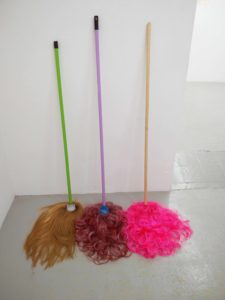 The prefabricated letters “TANTI AUMAI” are not only concerning the shop name in combination with the Italian “Tanti Auguri” (Best wishes). On the enterprise’s website, its objective is mentioned, to always closer to our houses to serve our satisfaction. Perhaps we should all have a banner like this at home, in case AUMAI enters one day? In consequence, “TANTI AUMAI” could be interpreted as a warning concerning the growing influence of major companies on our lives.
The prefabricated letters “TANTI AUMAI” are not only concerning the shop name in combination with the Italian “Tanti Auguri” (Best wishes). On the enterprise’s website, its objective is mentioned, to always closer to our houses to serve our satisfaction. Perhaps we should all have a banner like this at home, in case AUMAI enters one day? In consequence, “TANTI AUMAI” could be interpreted as a warning concerning the growing influence of major companies on our lives.
Alike that piece, the vileda mops with coloured wigs remind pop art. At the same time, they refer as well to Marcel Duchamp’s ready-mades and criticise the occidental neoliberalism in continuously inventing new merchandise to induce the client to buy more and more, even though the product is useless like these mops.
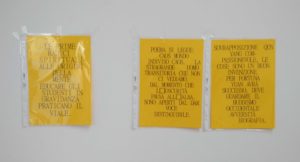 Less spectacular appears initially “Viaggio in occidente” (Journey to the West/Monkey): Three yellow sheets of paper in plastic cover, with some strange sentences. The artwork’s title illuminates the origin of the text. In the 16th century, one of the four great classical novels of Chines literature was published and attributed to Wu Cheng’en. It is the story of a monk, who travelled to the western regions of China, which is Central Asia and India, to obtain Buddhist sacred texts. Motivated by the bad quality of Chinese translations he undertook his journey despite an existing travel ban.
Less spectacular appears initially “Viaggio in occidente” (Journey to the West/Monkey): Three yellow sheets of paper in plastic cover, with some strange sentences. The artwork’s title illuminates the origin of the text. In the 16th century, one of the four great classical novels of Chines literature was published and attributed to Wu Cheng’en. It is the story of a monk, who travelled to the western regions of China, which is Central Asia and India, to obtain Buddhist sacred texts. Motivated by the bad quality of Chinese translations he undertook his journey despite an existing travel ban.
Giacomo Giacomo provides us with a brand new translation of the first lines of this novel. Made by copy and paste via Google translator, it is a fresh reinterpretation of the text. At the same time, the work is a hint to the digitally manipulated pictures and news of our daily lives, which often enough lead to fake-news nowadays.
Finally, the drawings and paintings of the artist are guiding inter alia to his personal inner sensitivities. The drawings on paper towel doubtlessly originate in his inner dream world, but remain faithful to the concept of the exhibition by the inexpensive plastic frames. Whereas the plastic film around the paintings is more than the style of decorative prints for sale. It reminds as well to a Veil of Maya, which is glided between the oeuvre and the recipients’ eye and allegorises the soul of the artist.
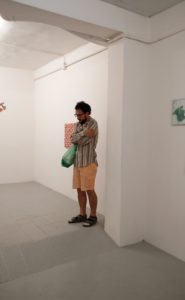 Giacomo Giacomo himself was present for the opening. Even unaware, he seemed to have merged with the exhibition. Standing there, with his plastic bag, he could have come directly from an AUMAI-shop. Questioned, if it is a performance, he negated. Could it be, that AUMAI entered so deeply in his conscious during the preparation of the show, that he is no longer sensible to the effect of the company on his life?
Giacomo Giacomo himself was present for the opening. Even unaware, he seemed to have merged with the exhibition. Standing there, with his plastic bag, he could have come directly from an AUMAI-shop. Questioned, if it is a performance, he negated. Could it be, that AUMAI entered so deeply in his conscious during the preparation of the show, that he is no longer sensible to the effect of the company on his life?
All chapters of Family Matters:
4 May: MEGAGALATTICO by Irene Fenara
8 May: Disegni e mezzi disegni, a carbone by Giuseppe De Mattia
12 May: Showroom by Marco Casella
16 May: Sucre by Gianfranco Mazza
20 May: 30th January 2017 – in progress by Mimì Enna
24 May: AUMAI by Giacomo Giacomo
28 May: Aufblühen by Marcello Tedesco
1 June: Super Golosi by Luca Bernardello, Paolo Bufalini & Filippo Cecconi

